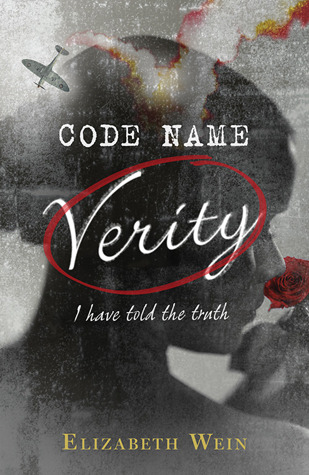“It’s like being in love, discovering your best friend.”
― Elizabeth Wein, Code Name Verity

- Release Date: February 6th 2012
- Publisher: Egmont Press
- Genre: Historical Fiction
- Hours: 10 hours 7 minutes
Synopsis: I have two weeks. You’ll shoot me at the end no matter what I do.
That’s what you do to enemy agents. It’s what we do to enemy agents. But I look at all the dark and twisted roads ahead and cooperation is the easy way out. Possibly the only way out for a girl caught red-handed doing dirty work like mine — and I will do anything, anything, to avoid SS-Hauptsturmführer von Linden interrogating me again.
He has said that I can have as much paper as I need. All I have to do is cough up everything I can remember about the British War Effort. And I’m going to. But the story of how I came to be here starts with my friend Maddie. She is the pilot who flew me into France — an Allied Invasion of Two.
We are a sensational team
Wow. Just Wow. Code Name Verity is one of those books that everyone raves about and you know what? They have good reason to. Code Name Verity is an amazing story and the audiobook version does this novel so much justice, I can’t recommend it enough. Between this and Out of The Easy, I just may have a new thing for historical YAs.
So, I’m going to quote Heidi from Bunbury in The Stacks review and say it seems like “The first rule of Code Name Verity is you don’t talk about Code Name Verity.” And I think that is a great sentiment because you don’t want to ruin the experience of the story for anyone, so I won’t really reveal to much about this novel.
The titular Verity, is a British spy sent into German-occupied France during World War II, when she is captured by the Gestapo (Nazi police). She is held as a prisoner in what was once a French hotel the story opens up as she begins her written confessions.
The narrative in this story is interesting because it is all told in written confessions. We only get as much as her captors allow her to write. But Verity isn’t telling just her story in these confessions; she is divulging the secrets through the story of her best friend Maddie. So while technically this is a first-person novel, this convention turns it into a kind of third person.
I highly suggest the audiobook for this novel as it really adds to the story. Because this story is a confessional you feel like you are actually hearing a recording of the confessions. There is even a section where Verity is so exhausted she starts writing song lyrics and the narrator starts singing and it just adds so much depth.
Also, because this book is focused on the European side of the war, there are a lot of German and French proper nouns and I liked not having to trip over them in print form. I mean I doubt I’d have known how to pronounce Hauptsturmführer without the audiobook to help me out.
Verity and Maddie’s story feels so real. Wein points out in the author’s note that while much of the story is based on history all the places and people are fake. I think part of the reason so many readers connect with it is because women like Verity very well could have existed. During World War II there really was a Women’s Auxiliary Air Force where women helped in the war effort. I’d actually be interested in Wein doing a book detailing where fiction and history diverged.
In the YA sphere specifically, there is so much talk of “strong female characters” and I’m not usually fond of this phrasing, but I have to say Code Name Verity has some very strong female characters. I don’t think they are strong because they fly planes as well as the boys or get to interrogate like the boys or get to enlist like the boys; it’s because they do something. This book is full of female characters who do things, not to show up the boys or be strong but because it’s the right thing to do. But Wein doesn’t sugarcoat it either, they do face their share of discrimination and harassment.
As an American, I don’t know much of the European version of WWII, so I was really drawn into this world of Europe in the crush of World War II. One of the parts of the novel that stood out to me is when a few characters begin to think about where the safest place in the world would be because all the Europeans were living in fear; fear of bombs being dropped on their heads, fear of their own classmates being spies, fear of the Gestapo. They even blackout all the signs in England so enemies can’t see where they are. There is even an anecdote of how in Ireland they made a big sign that says THIS IS IRELAND, so no German pilot would accidentally drop bombs thinking it was England.
A beautiful story of friendship and war that creates a powerful and flawless audiobook.

Shaking my head at the New York Times Review that said this book will appeal more to adults than teens because of the original cover and because teens won’t get all the historical references. This makes no sense to me because even I (a college-educated “adult”) didn’t get a lot of the references, but I still enjoyed the book.
Also, I personally think this book will resonate more with teens than other WWII novels schools typically require since the characters are young adults.

I’m a lifelong reader who started blogging about YA books in 2011 but now I read in just about every genre! I love YA coming of age stories, compelling memoirs and genre bending SFF. You can find me talking all things romance at Romance and Sensibility.